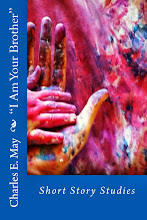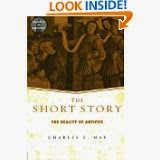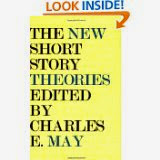One of the most
interesting, and promising, trends in the short story in the past few years is
the blossoming of interest in the form in England.
It has long been an unchallenged assumption in short story
criticism (what little there is) that English readers, critics, academics, and
therefore publishers, have seldom, if
ever, been interested in the short story—always preferring the bigger, more socially
important, more encompassing, and more profitable, novel.
Because the short story does not deal with unified social values,
the form seems to thrive best in societies where there is fragmentation of
values and people. This fragmentation has often been cited as one reason why
the short story became quickly popular in early nineteenth century America. In
1924, Katherine Fullerton Gerould said that American short story writers dealt
with peculiar atmospheres and special moods, for America has no centralized
civilization. "The short story does not need a complex and traditional
background so badly as the novel does," argued Gerould.
Wendell Harris and Lionel
Stevenson have suggested somewhat the same reason for the predominance of the
novel in English literature. Stevenson points out that as soon as a culture
becomes more complex, brief narratives expand or "agglomerate" and
thus cause the short story to lose its identity. The fragmentation of sensibility
did not set in in England until about 1880 at which time the short story came
to the fore as the best medium for presenting this fragmentation. Wendell
Harris also reminds us that the nineties in England were known as the golden
age of the short story and notes how with the fragmentation of sensibility,
perspective or "angle of vision "becomes most important in fiction,
especially in the short story in which, instead of a world to enter as in the
novel, the form presents a vignette to contemplate.
Harris has also noted that from Fielding to Hardy, fiction was
defined in England as "a presentation of life in latitudinal or
longitudinal completeness." This concept of narrative paralleled man's
intellectual concern with society; thus the short story was thought to be
insignificant in England until late in the nineteenth century when the
appropriate vision for it arrived. The "essence of the short story"
says Harris, "is to isolate, to portray the individual person, or moment,
or scene in isolation detached from the great continuum at once social and historical, on which it
had been the business of the English novel, and the great concern of nineteenth
century essayists, to insist." As Frank O'Connor has noted, whereas
the novel can adhere to the classical
concept of a civilized society, "the short story, remains, by its very
nature remote from the community romantic,
individualistic, and intransigent."
However, thanks to the energy of such writer/editors as Nicholas
Royle, writer/teachers as Ailsa Cox, and critic/reviewers as Chris Power—to mention
only three that come to mind right away—the short story has begun to generate
more interest in England. Short story prizes such as the Sunday Times EFG
Private Bank Prize, the BBC National Short Story Award, and the V.S. Pritchett Memorial
Prize give short-story writers something to aim for, while such web/blog sites as
the Short Review, The Short Story, Thresholds, and Short Stops keep short
stories in the eye of the public. Under the masterful editorship of Ailsa Cox,
Edge Hill University publishes a very fine academic journal Short Fiction in Theory and Practice. There
is even a National Short Story Day (Dec. 21), and an annual Small Wonder Short
Story Festival. With the exception of
the U.S.-based International Short Story Conference which occurs once every two
years, and the journal Short Story, there
is nothing in America to compare with these efforts.
During the summer I have been reading the first five volumes of
Best British Short Stories, ably edited by Nicholas Royle, and bravely
published by Salt Press. I don't know
how well the volumes for 2011, 2012, 2013, 2014, 2015 have been selling, but obviously
well enough to carry on for five years so far.
Royle has talked about how he started the series in a 2011 post on the
website Thresholds. I thank him for providing me with several weeks to good
reading this summer.
Now that I have read all the stories in the first five volumes
(over 100 altogether), I plan to read them all again in the next couple of
months and write blog posts on as many of them as I can, focusing on what makes
them such fine examples of the short story form.
I have been commenting on Best
American Short Stories and O. Henry Prize Stories for several years on this blog. The O.
Henry 2015 volume will be out in
early September, and the 2015 volume of Best
American Short Stories comes out in
October. I will, of course be reading
and commenting on those stories during the Fall.
And
just to keep myself happily busy, I have started reading the six volumes of Best European Fiction (2010—2015). The 2016 volume is due out in early
October. I will be posting blog essays
on many of those stories before the end of the year also.
I
know there is no guarantee that the stories in these "Best" volumes
from American, England, and Europe really represent the "best"
stories published in a given year. There
are always human variables when something is labelled the "best," not
the least of which who is doing the labelling, and who is doing the publishing.
However, when a knowledgeable editor has the stamina to read hundreds of
stories and make decisions about them, and when a brave publisher has the
vision to publish a volume that he or she knows is not going to sell that well—then
it is not a bad place to start reading the short story.
I
hope you will read with me in the next few months as I try to be the best
reader that these best stories deserve.





6 comments:
Looking forward to follow your readings. I'm a regular follower of your blog, I just never felt up to commenting right now - your knowledge is vast and a touch intimidating, and I'm just a writer with a side interest in academic studies.
Thank you for sharing all your insights!
Looking forward to your comments Charles! There's also lots going on in other parts of the British Isles - Frank O'Connor festival in Ireland, numerous small publishers over there, and more in Wales and Scotland, such as Parthian, Seren and Freight. When you look through those BBS collections you'll see how Nicholas Royle scours small publications - and he is also a fine short story writer himself.
Thank you so much, Charles, both for such an optimistic blog post and for mentions of ShortStops and the Short Review, much appreciated! To echo Ailsa, Ireland, Wales and Scotland have wondrous short story activity too, which we cover at ShortStops.
Very interested to see what you pull from the BSS collections. I have read them all, its a publishing highlight for me as the stories chosen by Royle always seem to be going somewhere new. Inventiveness the key it seems. Always reassures me that there is much scope for new ideas in the form, so be good to hear your opinion on those that couple it with quality to do something really exciting.
Nice. Keep posting.
shortstories.co.in
Some other UK trends -
Compared with the US I think we have fewer mags that publish both stories and poetry. There seems to be a recent trend amongst those that do to reduce the amount of prose. In a storyless issue "The Next Review" said that they weren't receiving good enough submissions.
There's a trend amongst the story magazines to have spined (often themed) "anthologies" rather than stapled, numbered issues.
A US trend that's arrived in the UK is to blur the distinction between competitions and submissions by making people pay to submit - see http://www.londonjournaloffiction.com/ for example.
Post a Comment